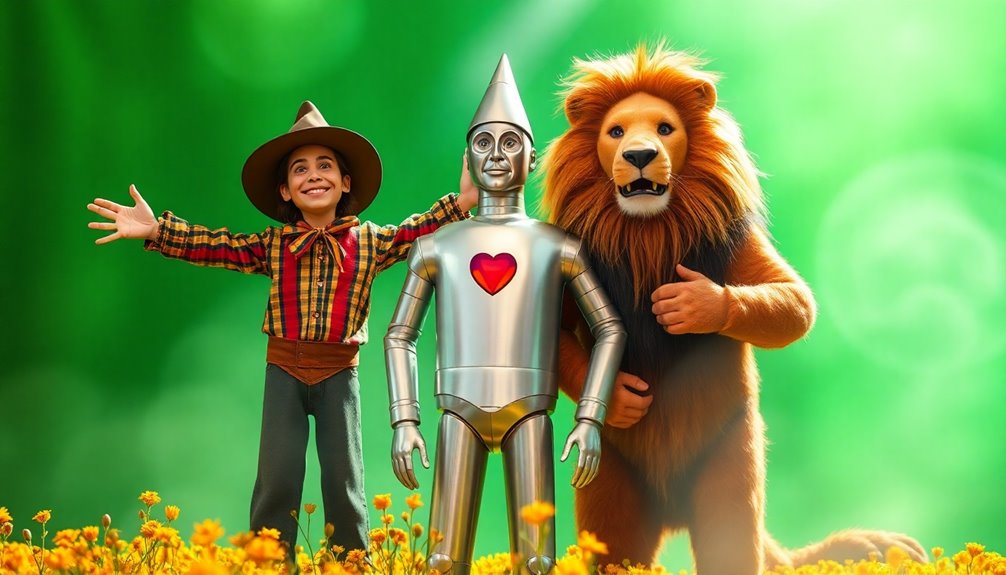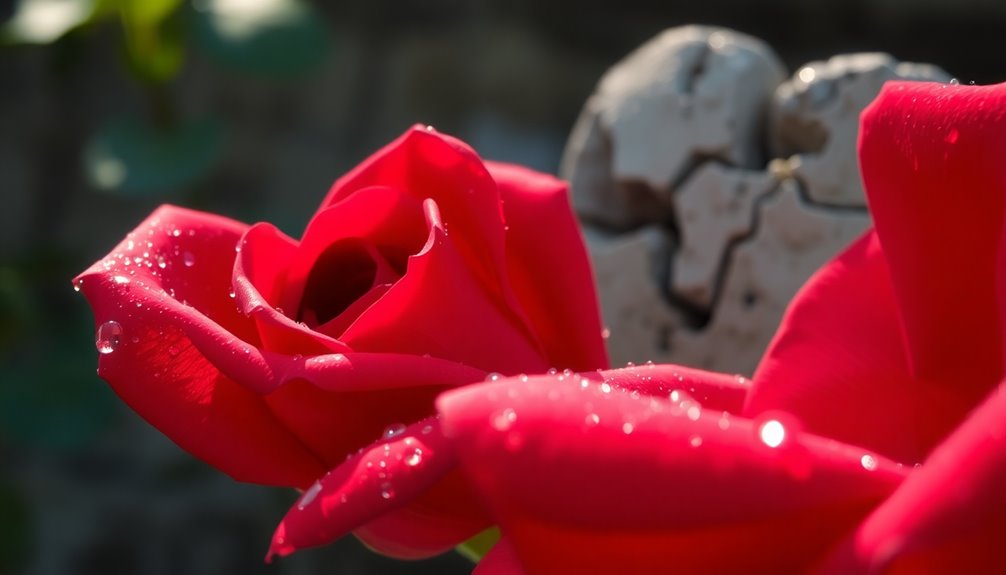Fire symbolism is fascinating and full of meaning! It represents the warmth and comfort of a cozy fire but also shows the chaos that comes with wildfires. In many cultures, fire connects people to the divine and plays a key role in rituals, like purification and remembrance. Psychologically, fire stands for passion, desire, and even inner struggles. It has been a life-giving force throughout history, providing warmth, safety, and community. Plus, it symbolizes transformation and rebirth, just like the phoenix. If you're curious, there's so much more to uncover about fire's incredible symbolism!
Key Takeaways
- Fire symbolizes duality, representing both life-giving warmth and destructive chaos in nature and human experience.
- It serves as a powerful metaphor for passion, desire, and transformation, often depicted in literature and art.
- In various cultures and religions, fire signifies divine presence, purification, and connection between humanity and the sacred.
- Fire rituals foster community, marking significant life events and facilitating connections with the spiritual realm and ancestors.
- Historically, fire has been essential for survival, cooking, and agriculture, illustrating its role as both a creative and destructive force.
Overview of Fire Symbolism
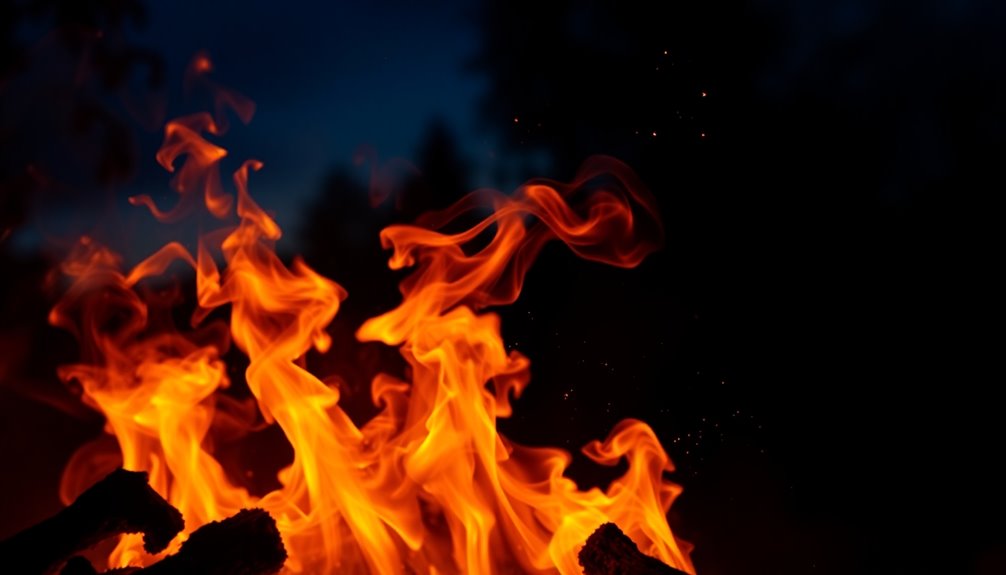
Fire symbolism encompasses a rich tapestry of meanings that reflect both the light and dark aspects of human experience. When you think of fire as a symbol, you might picture its warm glow or the fierce flames that can both create and destroy. It represents duality, showing how fire can bring life, like in a cozy campfire, yet also cause devastation, like wildfires.
In many cultures, fire signifies the presence of the divine. It's often seen in rituals that aim to purify or enlighten. You might even recall the phoenix, a mythical bird that rises from its ashes, showing how fire can lead to rebirth and transformation. This story beautifully illustrates the cycle of life and death.
In literature and poetry, fire serves as a powerful metaphor for passion and desire. You can almost feel the heat of emotions when characters meet or fight.
Even in nature, fire plays a crucial role. Controlled burns help rejuvenate ecosystems, proving that fire has its beneficial aspects too.
Fire's Role in Different Cultures
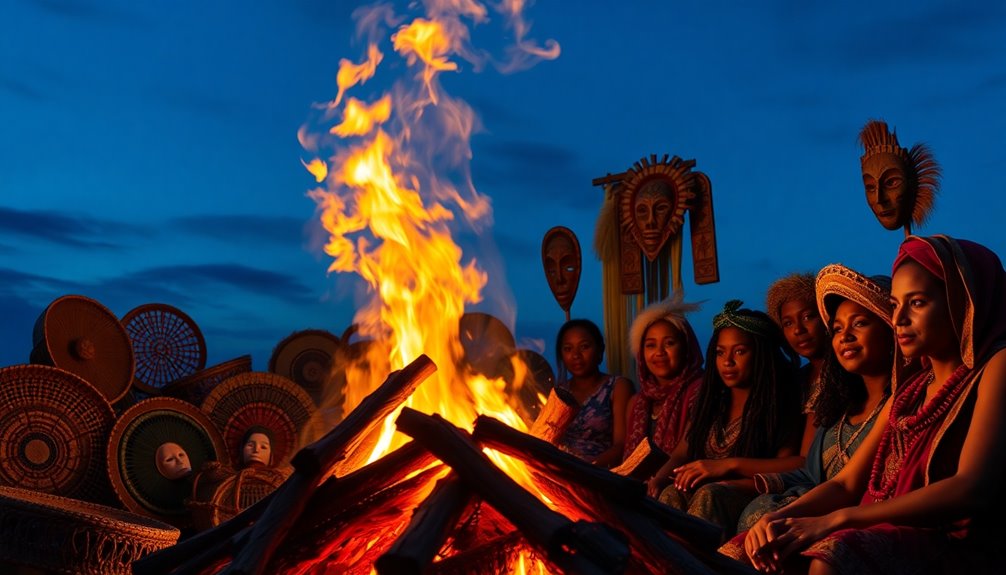
Throughout history, cultures around the world have embraced fire as a powerful symbol, intertwining it with their spiritual beliefs and rituals. In Hinduism, fire is personified by Agni, the fire deity who symbolizes purification. Agni plays a key role in rituals, connecting humans to the divine.
The ancient Greeks viewed fire as a precious gift from the gods. Prometheus even stole it to benefit humanity, showing how much they valued this light-bringing element.
In Christianity, fire represents divine presence and judgment. Think of the burning bush Moses encountered, or the idea of purgatory, where fire cleanses the soul.
Indigenous cultures see fire as a life-giving force, using it for warmth, cooking, and protection. It's central to community survival and spiritual practices.
In various African traditions, fire honors ancestral spirits. Rituals involving fire help remember the dead, connecting the living with their cultural identity.
Fire isn't just a source of light; it's a symbol of life, connection, and respect across many cultures. Its warmth brings people together, highlighting the joy and importance of this element in our lives.
Psychological Interpretations of Fire
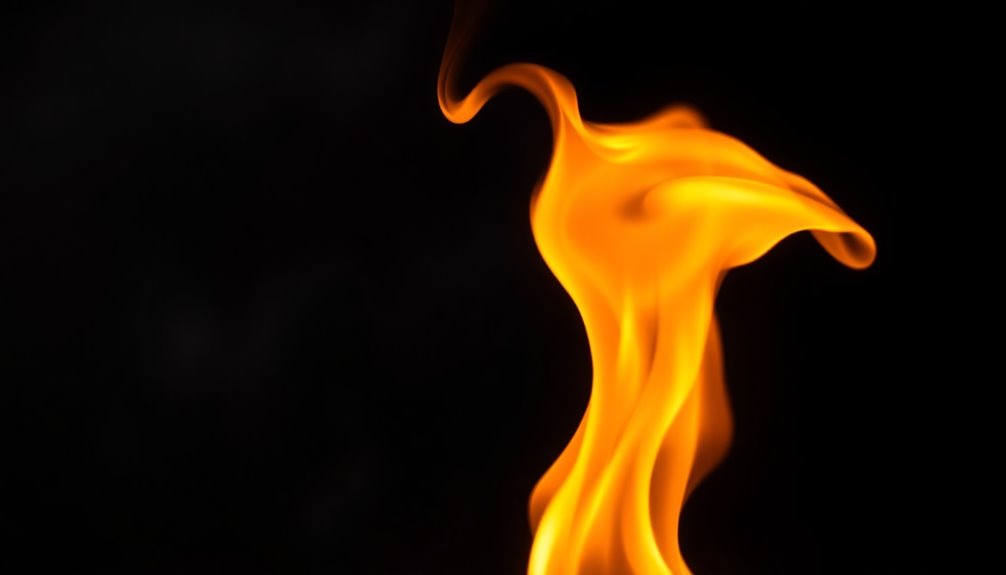
Across cultures, fire not only serves as a physical element but also embodies deep psychological meanings. Fire plays a fascinating role in our minds, representing both passion and conflict.
Sigmund Freud believed fire symbolizes our deepest desires and hidden feelings. It ignites thoughts of our forbidden passions, showcasing the struggles we face inside.
Fire also symbolizes destruction and rebirth, acting like a bridge between what's fading away and what's about to emerge. This dual nature reflects our complex emotions. Just like fire can create warmth and light, it can also bring destruction.
In dreams, a flickering flame might point to repressed feelings that need to be let out.
When you think of fire in art and literature, it becomes a tool for exploration. Artists use fire symbolism to express their innermost thoughts, allowing for personal growth and healing.
Whether it's a fiery painting or a story with burning themes, these expressions help you understand your feelings better.
Historical Uses of Fire
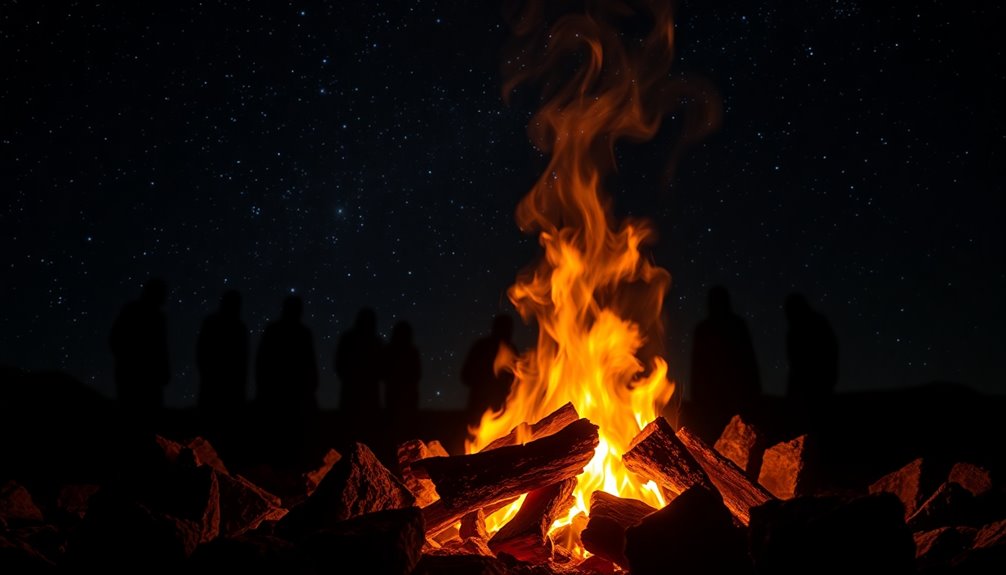
Fire has been an important tool for humans throughout history!
Early people used it for cooking, which made food safer and brought families together.
Later on, fire also changed the way we fought wars and built our cities, showing just how powerful this element can be in shaping our world.
Early Human Utilization
While early humans faced numerous challenges in their environment, the discovery and use of fire became a significant turning point in their survival and development.
Fire, one of the FOUR ELEMENTS, transformed how you lived. You cooked food with fire, making it safer and easier to digest. This not only made meals tastier but also improved your health!
Fire also provided warmth, allowing you and your community to survive in colder places. It kept predators at bay, giving you a sense of safety. With fire, you learned to forge metals, creating better tools and weapons that helped you hunt and gather more effectively.
Moreover, fire played an essential role in agriculture. You used it to clear land and control pests, which helped crops grow better, leading to more food.
But fire wasn't just practical; it brought people together! You gathered around the flames, sharing stories and building strong social bonds. This sense of community was critical for early human societies.
Warfare and Urban Development
The impact of fire extended beyond daily survival and communal gatherings; it also shaped the landscape of warfare and urban development. In battles, fire was a powerful tool. Armies used flaming arrows and siege engines to scare enemies and break down walls. This destructive power led to significant changes in cities. After conflicts, people rebuilt their homes with smarter designs to withstand fire.
Here are some key points about fire's role in warfare and urban growth:
- Fire helped create stronger weapons, improving military strength.
- Destructive events, like the Great Fire of London in 1666, led to better city planning.
- Controlled fire in farming increased food production, allowing larger populations to settle.
As cities rebuilt, they made wider streets and established fire codes to prevent future disasters.
Fire wasn't just a weapon; it was a catalyst for change. By promoting better structures and urban planning, fire played an essential role in shaping the cities we understand today.
It's amazing how something so elemental could lead to such innovative advancements in our communities!
Fire in Religion and Rituals
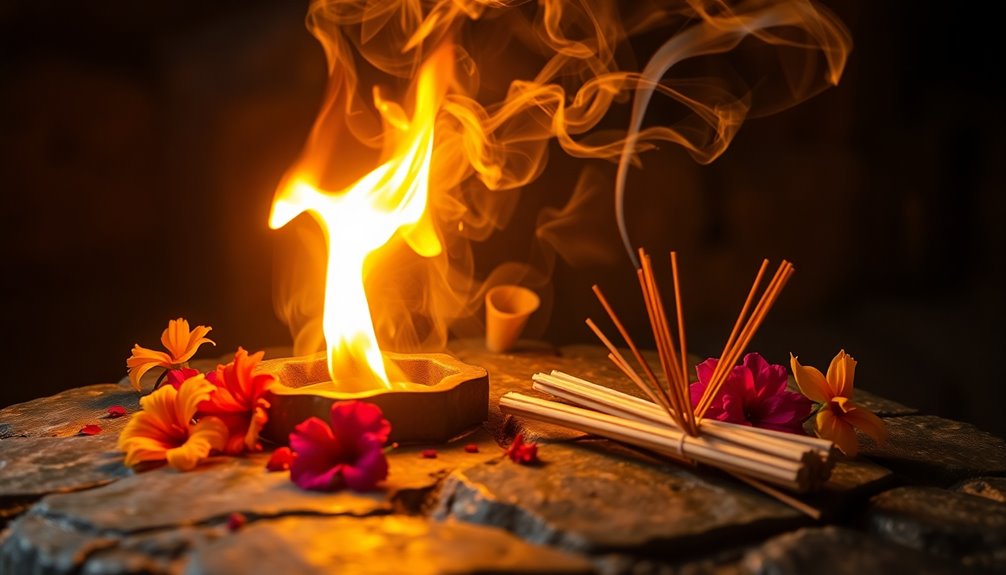
Fire has a special place in many religions and rituals, and it's really fascinating!
Sacred flames, like those in temples, help people feel connected to the divine and show their devotion.
Plus, fire is often part of funerary practices, providing comfort and a way to honor loved ones who've passed away.
Sacred Flames in Worship
Sacred flames ignite profound connections between the divine and humanity across various religions and rituals.
These flames serve as a source of light, guiding worshippers and symbolizing hope. From the flickering flame of a candle to the roaring fire of a sacred ceremony, each flicker tells a story of faith and devotion.
Here are some key meanings behind sacred flames in worship:
- Divine Presence: Flames can represent deities, like Vesta in Roman religion, showing that the divine is always close.
- Perpetual Worship: Eternal flames, like the Olympic flame, symbolize a never-ending connection between people and the divine.
- Purification and New Beginnings: Fire rituals, such as fire-walking, act as powerful acts of purification, allowing for transformation and fresh starts.
In Christian traditions, lighted lamps and candles illuminate the space during worship. They remind you of Christ's presence and the warmth of faith.
Sacred flames in worship help you feel connected to something greater, fostering joy and community. Embrace the light they bring, and let it inspire your spiritual journey!
Fire in Funerary Practices
In many cultures, the role of flames extends beyond worship and into the domain of honoring the deceased. Fire represents a powerful symbol during funerals, connecting the living with those who have passed away. For instance, in ancient Rome, extinguishing the hearth-fire during funerals marked a period of mourning. This act showed the deep bond between fire and the loss of life.
Here's a quick look at how fire plays a role in funerary practices:
| Culture | Fire's Role | Significance |
|---|---|---|
| Ancient Rome | Extinguishing hearth-fire | Marks mourning |
| Early Empires | Cremation | Purification of the body |
| Various Cultures | Light from candles and torches | Symbolizes remembrance |
| Global Practices | Fire rituals | Honors spirits of the deceased |
| Apotropaic Uses | Warding off evil spirits | Protects the deceased's spirit |
Whether it's through cremation or lighting candles, fire helps guide the souls of the departed. It's a beautiful way to celebrate life and remember those we love. As you see, fire truly plays a crucial role in funerary traditions around the world!
Rituals Involving Fire Elements
Throughout history, many cultures have relied on fire to enhance their spiritual practices and rituals. Fire isn't just a source of light; it carries deep symbolic meaning. In various religions, fire plays an essential role in connecting with the divine.
For instance, in Judaism, the eternal flame in synagogues represents God's everlasting light. In Hinduism, Agni, the fire deity, is invited during yajnas, where fire helps send offerings to the gods.
Here are some key aspects of fire rituals:
- Purity: In Zoroastrianism, the eternal flame symbolizes purity and divine presence.
- Transformation: Fire-walking ceremonies show faith and belief in fire's protective powers.
- Life Cycle: Cremation in Hindu rituals highlights the release of the soul, emphasizing life, death, and rebirth.
These rituals demonstrate fire's powerful role in spiritual life. Whether it's lighting candles or offering sacrifices, fire connects you to something greater.
It's a reminder of the warmth and light that faith can bring into your life. So next time you see a flame, remember the rich traditions and meanings it holds!
Dual Nature of Fire
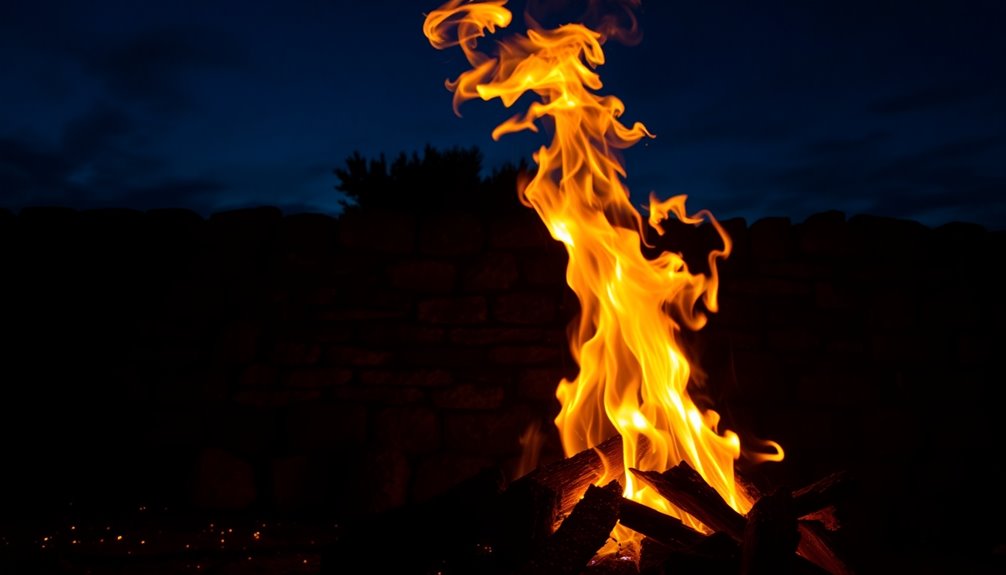
Embodying both creation and destruction, fire captivates us with its dual nature. On one hand, it provides us with light and heat, making our lives more comfortable and bright. Imagine cozy evenings by the fireplace or the warmth of a campfire under the stars!
Fire is vital for cooking food and bringing people together, creating memories around the flames.
On the other hand, fire can be dangerous. It has the power to cause pain and destruction, reminding us of the chaos it can release. In nature, fire plays an important role in renewing ecosystems. Controlled burns can help plants grow back stronger, showcasing fire's life-giving properties.
In many cultures, fire symbolizes transformation. It can purify and renew life but also represents deep psychological conflicts.
Think of the myths that speak of fire as a divine gift, inspiring creativity while also warning us of its fierce side.
Frequently Asked Questions
What Is the Symbolism of the Fire?
Fire has a lot of different meanings! It can symbolize both creation and destruction, showing how something new can rise from the ashes.
In many cultures, fire represents passion and strong emotions, lighting up our feelings. It's also a source of warmth and safety, helping people survive and thrive.
Fire can bring people together during celebrations or even spark creativity in art and stories.
Isn't it amazing how much fire can represent?
What Emotion Does Fire Symbolize?
You know what they say, "Where there's smoke, there's fire!"
Fire symbolizes a mix of emotions like passion and desire. It can spark love that lights up your heart, but it can also represent anger that burns fiercely.
Think about how flames flicker; they remind you of the ups and downs you feel. So, when you see fire, remember it's not just heat – it's a dance of feelings, both beautiful and intense!
What Does Fire Signify Literally and Symbolically?
Fire is super important! Literally, it gives us heat and light, helping us stay warm and cook food.
Symbolically, fire represents change. It can create new things but can also destroy. In many cultures, it's seen as a gift, bringing inspiration and knowledge.
Fire can show strong feelings, like passion or desire, and it's used in rituals for cleansing.
What Does Fire Mean Metaphorically?
Have you ever thought about what fire means beyond just flames?
Metaphorically, fire represents passion and desire, igniting our dreams and emotions. It can transform us, much like a phoenix rising from ashes, reminding you that new beginnings are possible.
Fire also purifies, cleansing your spirit in different cultures. While it can destroy, it creates growth.
Conclusion
Isn't it amazing how fire can mean so many different things? From warmth and comfort to danger and destruction, fire holds a special place in our hearts and cultures. It's a symbol of life, creativity, and even transformation. By understanding its many meanings, we can appreciate fire's powerful role in our lives and history. So the next time you see a flickering flame, think about all the stories and emotions it brings to light!


